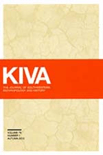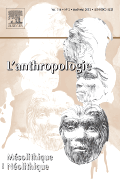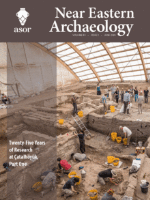
Stratum Plus
Scope & Guideline
Illuminating Interdisciplinary Insights in the Humanities
Introduction
Aims and Scopes
- Interdisciplinary Archaeological Research:
The journal focuses on interdisciplinary approaches that combine archaeology with anthropology, history, and environmental studies to provide a holistic understanding of past societies. - Cultural Heritage and Material Culture Studies:
Stratum Plus emphasizes the study of artifacts, burial practices, and material culture, exploring their significance in social, economic, and ritual contexts. - Paleodemography and Childhood Studies:
A unique contribution of the journal is its focus on childhood and demographic studies, examining burial practices, socialization, and cultural roles of children in ancient societies. - Technological and Scientific Analysis:
The journal promotes the use of advanced scientific techniques, such as isotopic analysis and radiocarbon dating, to enhance the understanding of archaeological findings and their implications. - Regional Archaeological Studies:
Stratum Plus covers a wide geographical range, focusing on archaeological findings from Eastern Europe, Central Asia, and the Caucasus, contributing to regional archaeological narratives.
Trending and Emerging
- Childhood and Socialization in Archaeology:
An increasing number of studies are focusing on the roles and representations of children in ancient societies, exploring how childhood experiences shape social structures and cultural practices. - Interdisciplinary Approaches to Archaeological Research:
There is a growing trend towards interdisciplinary research that incorporates insights from anthropology, sociology, and environmental studies, enhancing the contextual understanding of archaeological findings. - Scientific Methods in Archaeology:
The use of advanced scientific techniques, such as DNA analysis and geochemical methods, is on the rise, allowing for more nuanced interpretations of archaeological data and cultural practices. - Cultural Exchange and Interaction Studies:
Recent papers increasingly explore themes of cultural exchange and interaction, reflecting a shift towards understanding the complexities of ancient societies in a global context. - Ritual and Symbolism in Funerary Practices:
There is a notable trend towards examining ritual practices and their symbolic meanings in burial contexts, providing deeper insights into the spiritual and social dimensions of past communities.
Declining or Waning
- Traditional Historical Narratives:
There has been a noticeable decrease in papers focusing solely on traditional historical narratives without the integration of archaeological evidence, as the field moves towards more interdisciplinary approaches. - Focus on Purely Descriptive Studies:
The journal has seen fewer contributions that are purely descriptive in nature, as there is a shift towards analytical and interpretative research that engages with broader theoretical frameworks. - Single Culture Studies:
Research focusing exclusively on single cultures or societies without comparative analysis is becoming less frequent, reflecting a growing trend towards understanding cultural interactions and exchanges.
Similar Journals

OLBA
Empowering Researchers to Discover the UnseenOLBA is a distinguished journal in the field of archaeology, published by Mersin University Publications Research Center Cilician Archaeology in Turkey. With an ISSN of 1301-7667, this academic journal has been a platform for scholarly discourse from 2009 to 2014 and again from 2016 to 2019, with a recent volume published in 2022. Although it is currently categorized in the fourth quartile (Q4) for both Arts and Humanities and Social Sciences within archaeology, OLBA continues to contribute significantly to the global archaeology community. It serves as an essential resource for researchers, professionals, and students interested in the diverse aspects of archaeological studies and cultural heritage. Despite not being an open-access journal, OLBA strives to disseminate knowledge effectively, aiding in the exploration of ancient civilizations and the rich tapestry of human history. Its Scopus rankings, placing it in the bottom percentiles, demonstrate the ongoing need for the community to support and engage with the journal to enhance its visibility and impact in the archaeological domain.

Pamatky Archeologicke
Advancing archaeological knowledge through rigorous scholarship.Pamatky Archeologicke is a premier journal dedicated to the field of archaeology, published by the Academy of Sciences of the Czech Republic, Institute of Archaeology. Renowned for its rigorous scholarship and insightful contributions, the journal holds a distinguished position within the academic community, featured in the Q1 category of both archaeology and arts and humanities as of 2023. With impactful research articles that span a broad spectrum of archaeological inquiry, Pamatky Archeologicke serves as an essential resource for researchers, professionals, and students dedicated to understanding cultural heritage and archaeological methodologies. The journal enjoys a significant Scopus ranking, having achieved an impressive percentile ranking in both arts and humanities and social sciences disciplines. Although it currently does not offer open-access options, the journal remains committed to advancing the field of archaeology through high-quality research and critical discussions. Its scholarly contributions are crucial for fostering knowledge and innovation in the understanding of human history and prehistory.

Kiva-Journal of Southwestern Anthropology and History
Celebrating the Legacy of Southwestern CulturesKiva - Journal of Southwestern Anthropology and History is a distinguished academic journal published by Routledge Journals, Taylor & Francis Ltd, that serves as a vital resource for scholars in the fields of anthropology, archaeology, and history. With an ISSN of 0023-1940 and an E-ISSN of 2051-6177, this journal has established itself as a significant avenue for scholarly communication since its inception in 1964. It consistently ranks in the top quartiles, including Q1 in Archaeology and Q2 in Anthropology, reflecting its high impact and rigorous peer-review process. Covering a wide array of topics pertinent to the Southwestern United States, Kiva invites original research articles, reviews, and methodological papers that advance understanding of the region's rich cultural heritage and historical narratives. While currently not open access, its commitment to disseminating quality research makes it an essential reading for researchers, professionals, and students aiming to explore the multifaceted dimensions of southwestern studies.

Ancient Civilizations from Scythia to Siberia
Charting the Course of Ancient Cultures in EurasiaAncient Civilizations from Scythia to Siberia, published by BRILL, is a pivotal journal dedicated to the exploration and scholarly analysis of ancient cultures in Eurasia, with a focus spanning from the Scythian tribes to the Siberian territories. With an ISSN of 0929-077X and an E-ISSN of 1570-0577, this journal plays a significant role in the fields of Archeology, Classics, and History, holding esteemed rankings in Q3 and Q1 categories, thus affirming its status in the academic community. Covering a wide temporal range from 1995 to 2024, the journal aims to provide a comprehensive platform for researchers and students to disseminate their findings and foster collaborative discourse. With impact rankings in the 86th and 75th percentiles for Classics and History, respectively, it is recognized for its high-quality contributions that advance knowledge in these areas. Although currently not an open-access journal, it offers various options for accessing its rich content. By bridging gaps in historical understanding and engaging with the complexities of ancient societies, Ancient Civilizations from Scythia to Siberia remains an essential resource for those passionate about uncovering the narratives of our past.

Cuadernos de Prehistoria y Arqueologia-Universidad Autonoma de Madrid
Advancing Knowledge in Archaeology and PrehistoryCuadernos de Prehistoria y Arqueologia-Universidad Autonoma de Madrid is a distinguished academic journal dedicated to the fields of archaeology and prehistory, published by the Universidad Autonoma de Madrid, Departamento de Prehistoria y Arqueología. With an ISSN of 0211-1608, this journal plays a crucial role in disseminating significant research findings and theoretical advancements within these domains. Recognized for its scholarly excellence, it holds impressive quartile rankings in 2023, including Q2 in Archaeology and Q1 in History, reflecting its high impact within the academic community. While currently not an open-access publication, Cuadernos de Prehistoria y Arqueologia provides valuable insights to researchers, professionals, and students engaged in the exploration of human history and cultural heritage from 2018 to 2024 and beyond. With a commitment to fostering interdisciplinary dialogue, this journal serves as an essential platform for innovative studies and comprehensive reviews, contributing to the advancement of knowledge in archaeology and prehistory.

ANTHROPOLOGIE
Exploring the Depths of Human UnderstandingANTHROPOLOGIE, published by Elsevier France - Éditions Scientifiques Médicales Elsevier, is a leading academic journal dedicated to advancing the fields of Anthropology and the History and Philosophy of Science. With a publication history that dates back to 1947, this esteemed journal has steadily carved its niche within the scholarly community, achieving a commendable Q2 rank in both the aforementioned categories in 2023. Although it does not offer Open Access, ANTHROPOLOGIE provides robust access options through institutional subscriptions, ensuring that researchers and practitioners alike can delve into its rich repository of knowledge. The journal's impact is underscored by its competitive Scopus rankings, particularly its position within the 65th percentile for History and Philosophy of Science and 56th percentile within Anthropology. Through rigorous peer-reviewed articles that illuminate a wide array of anthropological inquiries and philosophical debates, ANTHROPOLOGIE continues to be an essential resource for those committed to exploring the complexities of human behavior, culture, and scientific understanding in an ever-evolving world.

Prilozi Instituta za Arheologiju u Zagrebu
Illuminating the archaeological landscape with impactful research.Prilozi Instituta za Arheologiju u Zagrebu is a prominent academic journal published by INST ARHEOLOGIJU, dedicated to advancing the field of archaeology and related historical studies. Operating in Croatia, this journal serves as a vital platform for scholars, researchers, and students to disseminate innovative research and insights within the realm of archaeology, with a focus on the rich cultural heritage of the region. The journal spans contributions from 2002 to 2011 and has ongoing publication since 2013, reflecting its commitment to contemporary archaeological discourse. With a growing reputation, it has achieved a Q3 ranking in the fields of Archaeology and Arts and Humanities, and a Q2 ranking in History, signifying its impact and relevance in the academic community. Although Open Access options are not available, the journal remains an essential resource for those pursuing in-depth knowledge and research in archaeology. Researchers can harness the journal's extensive scope to explore critical historical narratives and archaeological findings, solidifying its importance in both local and global contexts.

NEAR EASTERN ARCHAEOLOGY
Exploring the Rich Tapestry of Near Eastern HeritageNEAR EASTERN ARCHAEOLOGY, published by University of Chicago Press, is a premier journal dedicated to the field of archaeology, particularly focusing on the rich cultural heritage and archaeological findings of the Near East. With an ISSN of 1094-2076 and an E-ISSN of 2325-5404, this esteemed publication provides a vital platform for scholars and practitioners to share their research, insights, and discoveries. The journal holds an impressive ranking in the Q1 quartile for both Archaeology and History in 2023, reflecting its significant impact within these fields and a robust history of scholarly contribution. The journal has been pivotal in shaping discussions around archaeological methodology, theory, and contemporary issues from 2002 to 2024, as it continues to reach a wide audience through various access options. With Scopus rankings placing it in the top percentiles for both History and Archaeology, NEAR EASTERN ARCHAEOLOGY represents an essential resource for researchers, professionals, and students alike, fostering the exploration and understanding of the region's archaeological narrative.

Intersecciones en Antropologia
Fostering collaboration in the heart of anthropology.Intersecciones en Antropologia, published by the Universidad Nacional del Centro de la Provincia de Buenos Aires (UNICEN), Facultad de Ciencias Sociales, is a premier open-access journal in the field of anthropology, having established its presence since 2010. With an impressive impact factor and currently holding the distinguished Q1 quartile ranking in anthropology for 2023, this journal has quickly become a vital resource for scholars and practitioners alike, offering a platform for innovative research and critical discussion. The journal aims to advance anthropological scholarship by encouraging the dissemination of diverse perspectives and stimulating dialogue across geographical and cultural boundaries. Its open-access model, adopted in 2017, ensures that valuable research findings are accessible to a global audience, fostering collaboration and engagement within the academic community and beyond. Located in the vibrant cultural context of Argentina, Intersecciones en Antropologia serves as a conduit for significant anthropological dialogues, making it an essential read for those dedicated to understanding and contributing to the evolving landscape of social sciences.

Ancient Asia-Journal of the Society of South Asian Archaeology
Unearthing the Rich Tapestry of South Asian HeritageAncient Asia - Journal of the Society of South Asian Archaeology, published by ARF India, stands as a pivotal resource for the exploration and dissemination of archaeological research focused on the rich history and culture of South Asia. Since its inception as an Open Access journal in 2006, it has become an essential platform for scholars and enthusiasts alike, boasting an impressive range of quartile rankings across multiple disciplines, including Anthropology, Archaeology, History, and Visual Arts. With expansion into various indexed categories and consistent dissemination of impactful research common to this highly diverse field, Ancient Asia aims to foster interdisciplinary dialogue, facilitate collaboration among researchers, and enhance the global understanding of ancient civilizations within the region. By embracing an inclusive access model, the journal encourages wide readership and engagement, positioning itself as a key player for students, professionals, and academics interested in delving into the archaeological marvels of South Asia.